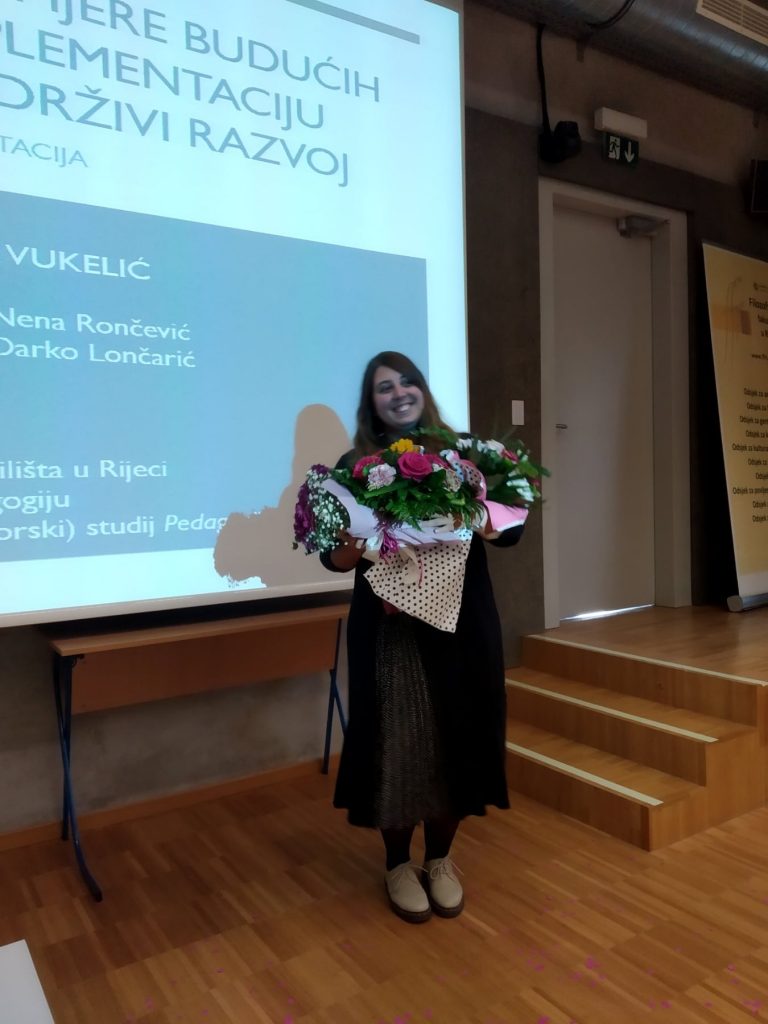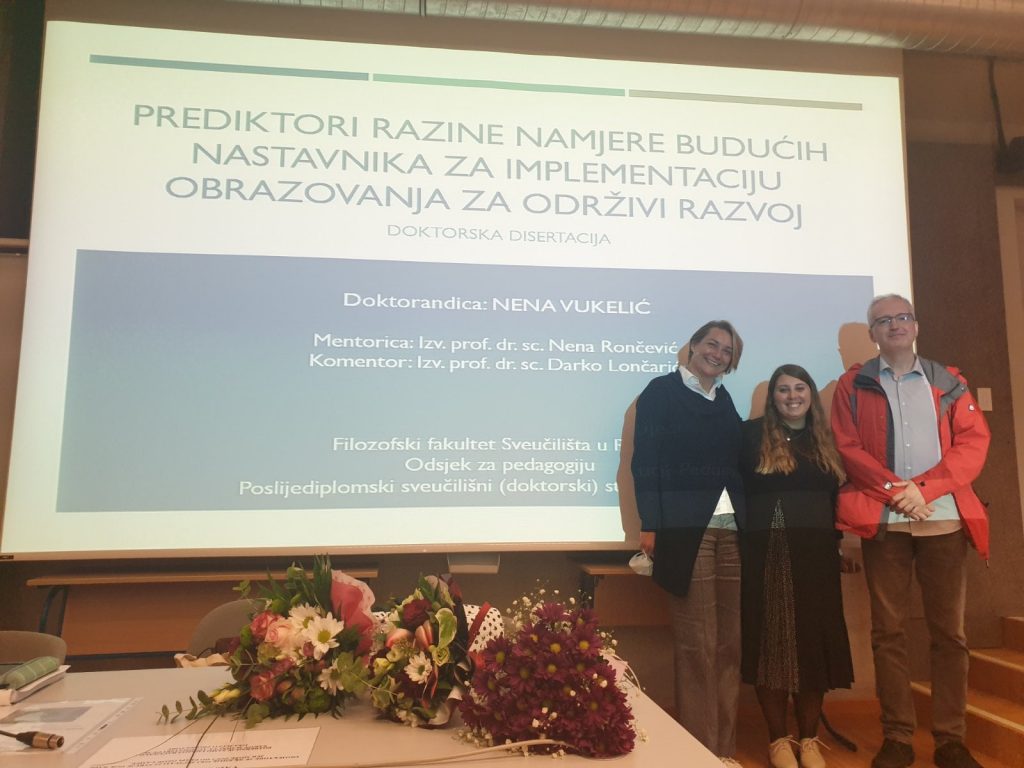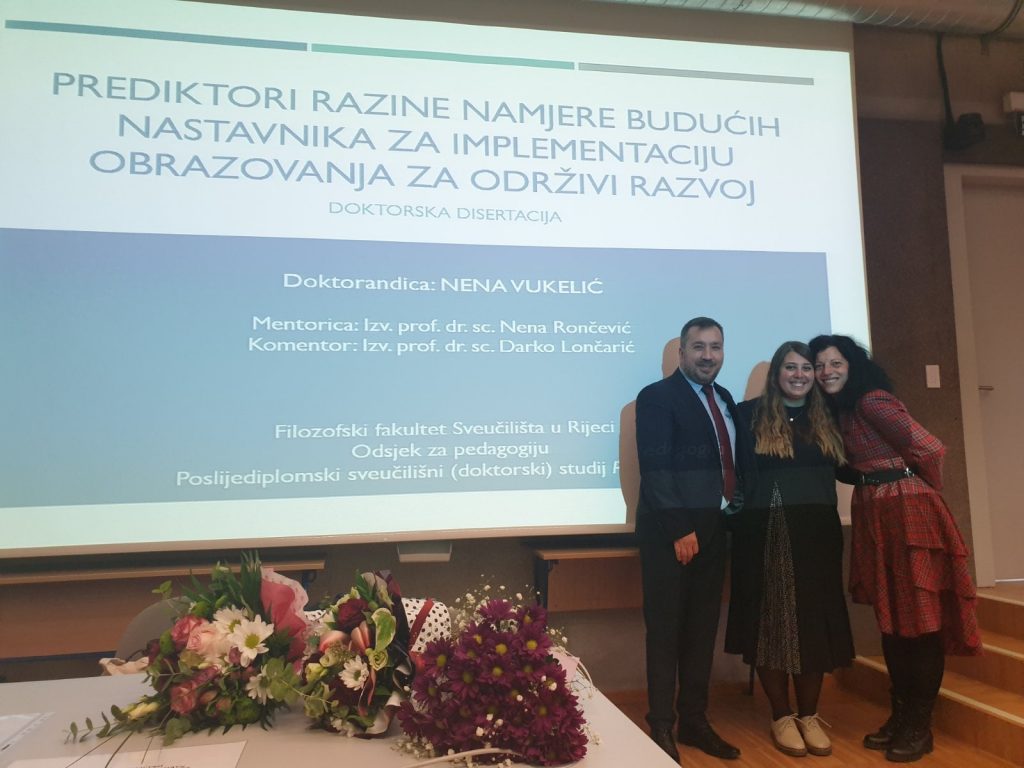Project team members Nena Vukelić and Nena Rončević published a paper in the journal Social Sciences titled “Student Teachers’ Willingness to Act in the Climate Change Context”.
Student teachers’ sustainable behavior
Project team members Nena Vukelić and Nena Rončević published an article “Student teachers’ sustainable behavior” in the journal Education Sciences.
Ph.D thesis “Predictors of student teachers’ intentions to implement Education for Sustainable Development” defense
ECER & ERC 2021
Project team members Nadja Čekolj and Bojana Ćulum Ilić presented their paper “(De)constructing Sustainability Citizenship: Insight from literature and policy documents analysis” on the Emerging Researchers’ Conference held September 2 – 3 online.
Project team members Nena Vukelić and Nena Rončević presented their paper “Student Teachers’ Sustainable Behaviors: Testing a Model” on the European Conference on Educational Research held September 6-10 online.

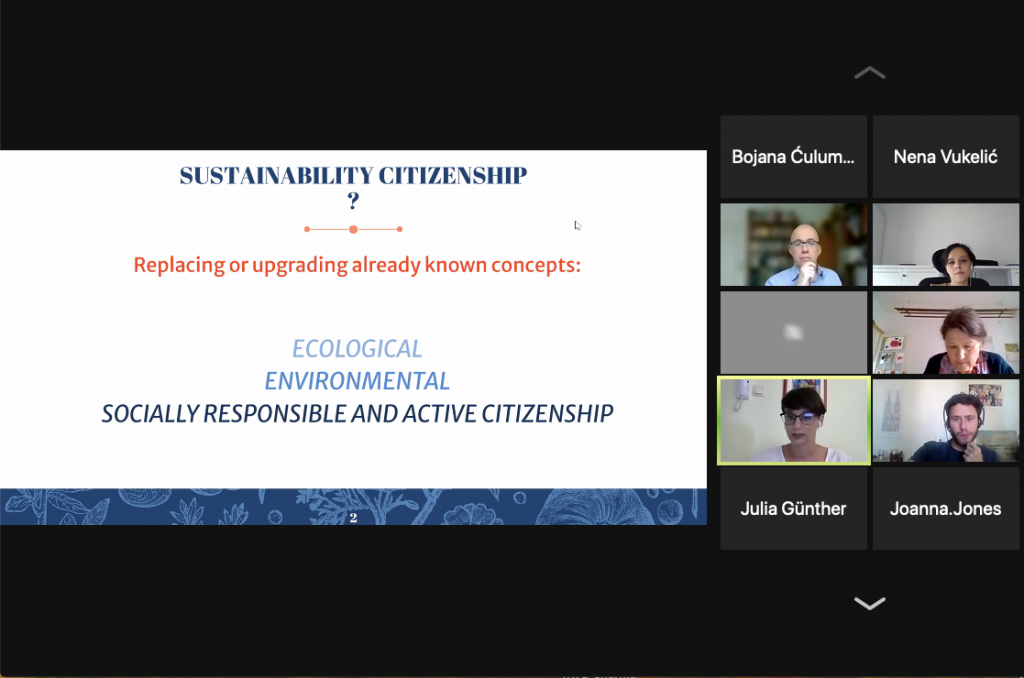
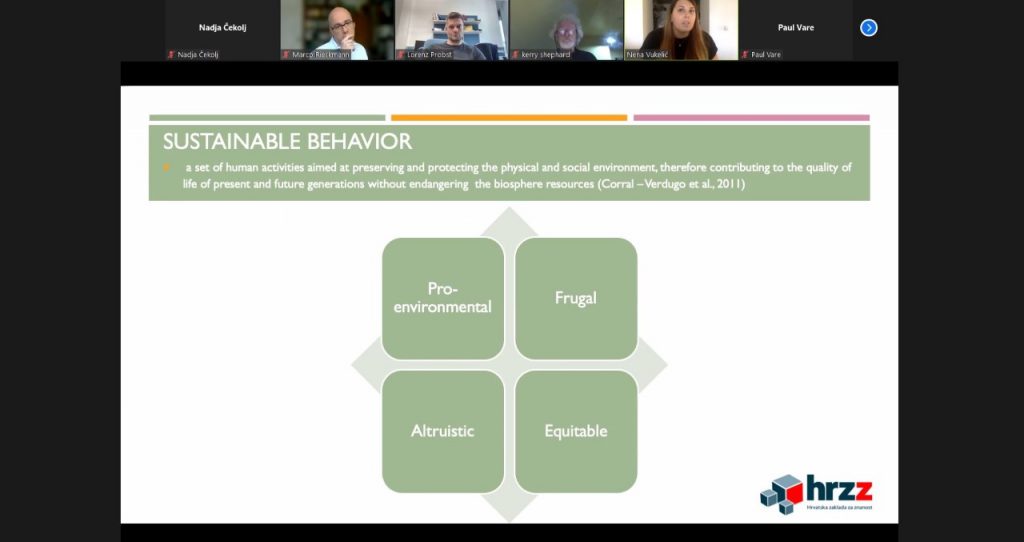
25th Summer School in Social Sciences Methods 2021
Project team members, Nadja Čekolj and Nena Vukelić participated in the 25th Summer School in Social Sciences Methods in organisation of Universita della Svizzera Italiana. Summer School was held from 13. to 27. August 2021.
Nena Vukelić participated in two workshops – R-Data-Bootcamp (prof. Peter Gruber) and Multilevel Modeling (prof. Andrew Bell). Nadja Čekolj participated in the workshop Qualitative Analyses of Interview Data by prof. Jolanta Drzewiecka.
Part of the programme was held online and part onsite on the campus in Lugano.
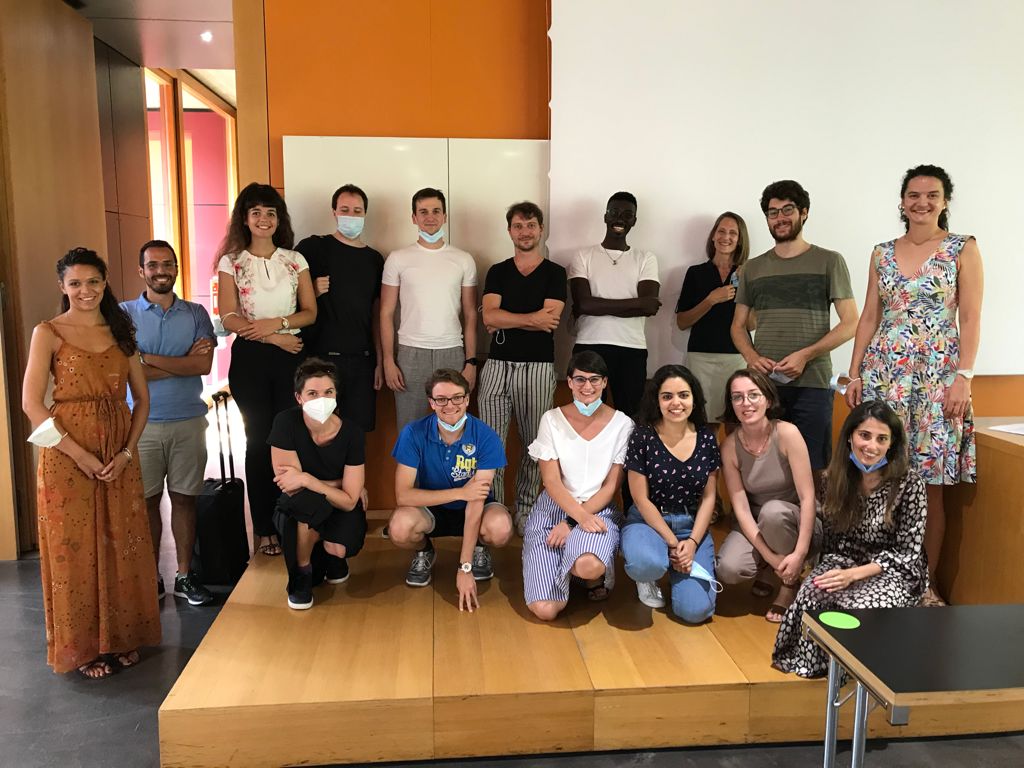
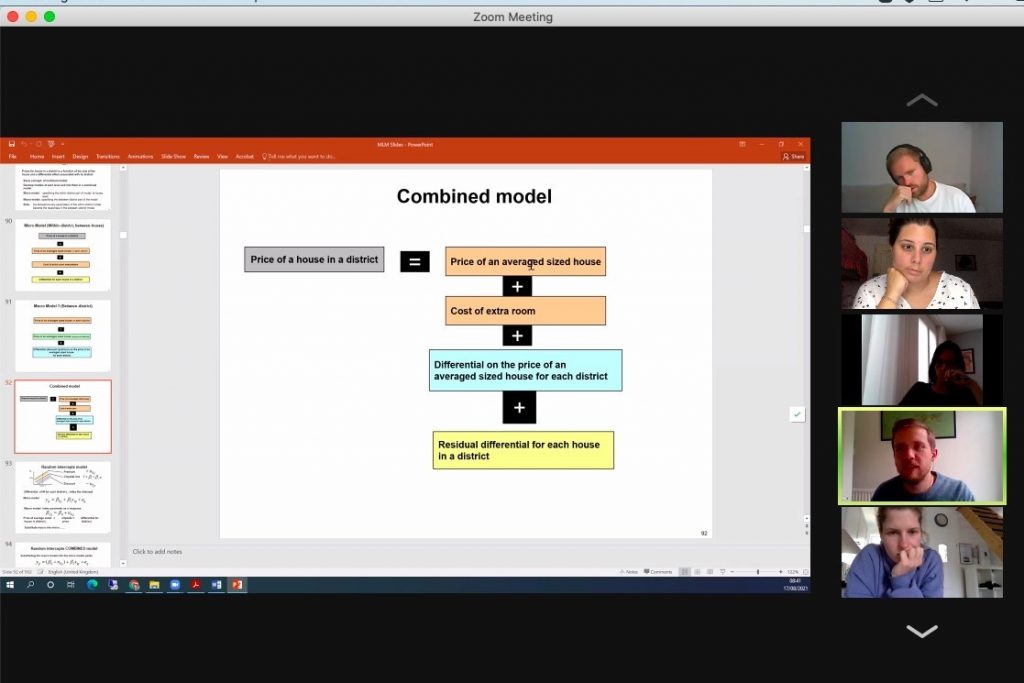

Validation of measuring instruments in the field of education for sustainable development
Project team member Nena Rončević is the author of an original scientific paper “Validation of measuring instruments in the field of education for sustainable development”.
The paper is published in the Proceedings of the Department of Education (University of Rijeka, Faculty of Humanities and Social Sciences) “In a network of paradigms: A look at the research horizon in education – Proceedings in honor of Branko Rafajac, Ph.D, professor emeritus ”.
The paper is available in open access at the link: http://izdavastvo.ffri.hr/wp-content/uploads/2021/04/Zbornik-U-mrezi-paradigmi-E-BOOK.pdf#page=116
Representation of sustainable development in study programmes of teacher education in Croatia
Project team members , Nena Vukelić and Nadja Čekolj, are the authors of an original scientific paper “Representation of sustainable development in the study programmes of teacher education in Croatia”. The paper is published in the Proceedings of the Department of Education (University of Rijeka, Faculty of Humanities and Social Sciences) “In a network of paradigms: A look at the research horizon in education – Proceedings in honor of Branko Rafajac, Ph.D, professor emeritus ”.
The paper is available in open access at the link: http://izdavastvo.ffri.hr/wp-content/uploads/2021/04/Zbornik-U-mrezi-paradigmi-E-BOOK.pdf#page=148
Adult education teachers’ competencies for the implementation of sustainable development
Project team member Siniša Kušić is the author of an original scientific paper “Adult education teachers’ competencies for the implementation of sustainable development”.
The paper is published in the scientific journal Studies in Adult Education and Learning.
The paper is available in open access at the link: https://revije.ff.uni-lj.si/AndragoskaSpoznanja/article/view/9879
Pedagogical research and school practice
Project team members, Nadja Čekolj, Bojana Ćulum Ilić i Marija Brajdić Vuković, participated in 26th International Scientific Conference “Pedagogical research and school practice – Qualitative research through disciplines and contexts: designing similarities and differences”. Conference was held on March 12th and 13th at Zoom platform. Authors presented a paper “School Volunteering Programmes and Sustainability Citizenship – case study of innovative platform”.
Conference was organised by Institute for Educational Research in Belgrade and Institute for Psychology at Faculty of Philosophie, University of Belgrade.
Education Sciences and Sustainability Special Issue “Education for Sustainable Development and Teaching: Challenges, Practice and Research”
Project team members Nena Rončević and Nena Vukelić are guest editors of the joint Special Issue “Education for Sustainable Development and Teaching: Challenges, Practice and Research“of the journals Education Sciences and the journal Sustainability.
This special issue is now open for submission until 30 June 2021. More information about the special issue down below.
Special Issue Information
SDG 2030 includes 17 global goals that are not achievable without education for sustainable development (ESD). Modern approaches to ESD include interdisciplinary sciences, transformational learning, and the active role of students.
The implementation of ESD in systems at all levels of education depends on a number of factors, most notably the role of teachers. The final report of the UN Decade of Education for Sustainable Development, titled “Shaping the Future We Want”, explicitly emphasizes that when it comes to the continuous professional development of preschool and primary school teachers and overall educators, it is necessary to more significantly work on this aspect of education and develop it further. Therefore, it is necessary to review the existing models of education and professional development of educators . Educators, namely teachers, are the most important components between students and ESD, and their role is to foster connections with nature, empathy, and positive attitudes about the environment, which are values, attitudes, and behaviors that will be the foundation for more sustainable lifestyles and thus will contribute to SDG 2030.
This Special Issue of Education Sciences attempts to answer significant questions encompassing a number of factors that are an integral part of ESD-focused practice and that influence initial teacher education and professional development. These include the following:
- What are the preconditions for the successful implementation of ESD in education systems at all levels?
- What do they depend on, or what factors? How can a more significant connection of children/pupils/students with nature be encouraged, and thus the development of knowledge, values, attitudes, and behaviors meeting the SDG 2030?
- What are the characteristics of a modern teacher who implements ESD?
- What are his/her personality traits, values, abilities, and competencies?
How can we improve teacher education and lifelong professional development for ESD? What are some examples of good practice and research of modern ESD in kindergartens, schools, and universities?
How can digital technology-based education systems respond to these challenges in the context of the “pandemic experiences” of ESD implementation? What are these new pedagogies and new ways of teaching and learning in ESD during the time of COVID-19?
Such a broad goal of this issue of Education Sciences provides an opportunity to view and analyze the problems of modern ESD and professional development of educators in facing the challenges of SDG 2030, but also the challenges of the current era, which are influenced by digital technologies and the global pandemic of COVID-19.
We invite all interested scientists, practitioners, researchers, and stakeholders who are considering and researching these topics to contribute to the actualization of these complex and significant issues in a world that is undoubtedly changing and seeking new approaches to dealing with ESD.

